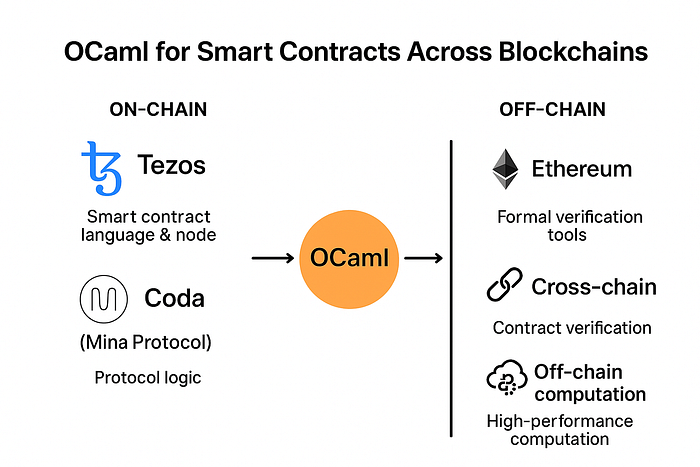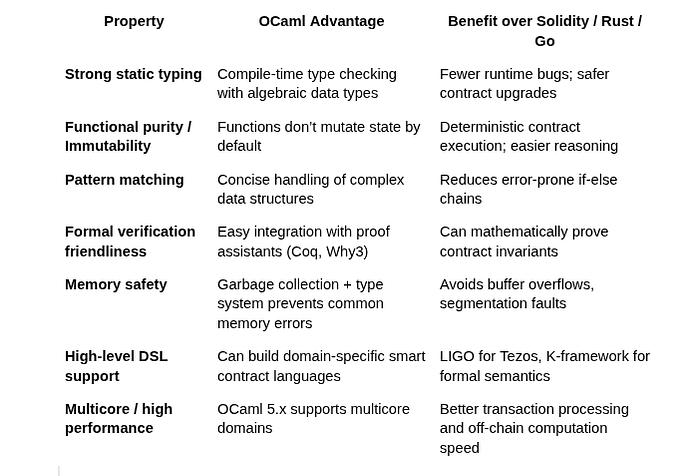Why OCaml is a Secret Weapon for Smart Contracts Across Blockchains
Hello Everyone !
Blockchain developers often debate: which language is best for smart contracts? Solidity dominates Ethereum, Rust and Simplicity popular in Bitcoin, Rust is popular on Solana, and Haskell powers Cardano. But there’s another language quietly powering some of the most secure, high-assurance smart contracts in production: OCaml.
OCaml’s combination of functional programming, strong type safety, and formal verification support makes it a standout choice for multi-chain development. Let’s explore where it shines.
Visual Diagram

Chains Where OCaml is Already Used
Tezos
- Smart Contract Language: Michelson (stack-based), but high-level development uses LIGO (Pascal/Cameligo/ReasonLIGO), which compiles to Michelson.
- Reasoning: OCaml is the main language for Tezos node implementation and LIGO compiler.
- Benefit: Developers get strong guarantees about transaction safety and predictable gas costs.
Coda / Mina Protocol
- Written in OCaml for core protocol logic.
- OCaml’s immutability and pattern matching simplify zero-knowledge proof state tracking.
Ethereum (via formal verification & tooling)
- OCaml powers tools like Marlowe / K Framework for smart contract formal verification.
- Can model EVM bytecode semantics and detect vulnerabilities before deployment.
Other emerging chains
- Any blockchain needing formally verified nodes or smart contract DSLs can leverage OCaml.
- Examples: Concordium, Efficient cryptographic zk-chains, or private blockchains with formal compliance guarantees.
Smart Contract Properties Where OCaml Excels

Example: OCaml vs Solidity in a Voting Contract
Solidity snippet (simplified):
mapping(address => bool) public voted;
function vote() public {
require(!voted[msg.sender]);
voted[msg.sender] = true;
}OCaml + Michelson via LIGO:
type storage = (address, bool) map
type parameter = Vote of address
let main (p : parameter) (s : storage) : (operation list * storage) =
match p with
| Vote(addr) ->
if Map.mem addr s then failwith "Already voted"
else [], Map.add addr true sAdvantages:
- Strong typing ensures
addris always a valid address - Immutable map prevents accidental overwrite
- Easier formal proofs to guarantee “double voting is impossible”
OCaml’s Multi-Chain Potential
Cross-chain smart contract verification
- Use OCaml to model contracts on Ethereum, Tezos, Solana
- Prove invariants across chains (e.g., token bridges, liquidity pools)
Off-chain computation
- OCaml can run complex off-chain logic (batch transaction validation, zk-snark witness generation)
- Multicore support allows massive parallel data processing
DSLs for specific blockchains
- Build domain-specific languages tailored to chain semantics (like LIGO for Tezos or Marlowe for financial contracts).
Why OCaml Beats Other Languages in Certain Scenarios
Versus Solidity:
- OCaml’s type system + immutability = safer contracts
- Easier integration with formal verification tools
Versus Rust:
- Rust is low-level and requires manual memory management; OCaml is higher-level for proofs and DSLs.
Versus Python / JavaScript:
- Strong typing and functional purity reduce runtime errors and security risks.
Takeaways
- OCaml isn’t just academic — it powers real-world blockchains like Tezos and Mina.
- Smart contracts built via OCaml DSLs benefit from type safety, functional purity, and formal proofs, minimizing costly bugs.
- OCaml can be used in multi-chain, off-chain, and cross-chain environments, making it ideal for DeFi, NFTs, and enterprise blockchain solutions.
Conclusion:
Developers looking for safe, performant, formally verifiable smart contracts should consider:
- Learning LIGO or ReasonLIGO for Tezos.
- Exploring Marlowe / K-framework for formal proofs.
- Using OCaml for off-chain computations in multi-chain applications.
Listen To The Article

Black Friday 30%
Offer









